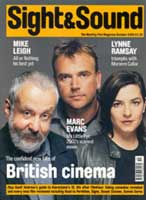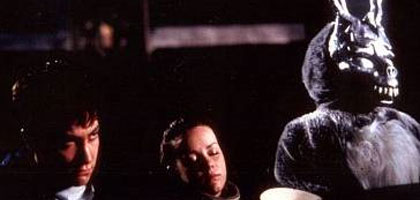
Darkness Visible
Film of the Month: Donnie Darko

With its uncanny atmosphere and its intricate web of secretly connected details, Donnie Darko is a cult movie in the making. By Leslie Felperin
There's
a lovely moment in Donnie Darko that director Richard Kelly, whose
first feature this is, talks about at some length in the commentary
on the Region 1 DVD, already released in the US. (He says a lot
of interesting things in that commentary, but more on that later.)
Kelly describes it as the soul of the movie, based on a completely
inconsequential but similar moment in his own life that he never
quite forgot, when he and a woman he never met waved to each other
from passing cars. And so at his film's very end one character waves
mournfully to another from across a street. The two people don't
know each other at all at this point, and perhaps they never will
because the character that connected them in another timeline has
just died. The wave is a phantom of that other-time connection,
one they feel numbly compelled to make.
Donnie Darko is all about seemingly inconsequential but secretly
connected details, and divine forces that compel characters to actions
they don't understand. As in a well-constructed poem, images and
lines resonate with each other. A teacher (Drew Barrymore, also
one of the film's executive producers) writes the words "cellar
door" on a blackboard, and then a real door plays a crucial role
later on. The injunction "wake up" echoes down the movie's corridors.
A bemused man on a golf course in the opening sequence will prove
to be a false prophet, whose lost wallet near another green will
lead to his downfall. A madwoman whispers something in the main
character's ear, and both her words and their full import will be
unfolded only later: "Every living creature on Earth dies alone."
Boiling the plot down to a few lines, or even to the 400-word synopsis that appears elsewhere in this issue, risks making the story's knotty skein of incident sound either trite, ridiculous or incomprehensible. But here we go anyway. The bulk of the movie follows a timeline in which its title character (hungrily played by Jake Gyllenhaal), a disturbed teenager who appears to be suffering from paranoid schizophrenia, is led by visions of Frank, a man in a fake-fur suit and nightmare rabbit mask, to commit a series of crimes while sleepwalking in his small town in 1988. Frank tells him the world will end in precisely 28 days, six hours, 42 minutes and 12 seconds, and in a way it does. The plotline branches out to include Donnie's damaged girlfriend Gretchen (Jena Malone), who's trying to escape her violent stepfather; a self-help guru (Patrick Swayze) with a dark secret; and various other characters whose lives are touched by Donnie in one way or another. Among other things, this is a distorted version of It's a Wonderful Life, but with a cool-naff 1980s soundtrack.
Overhyped before it even got to Sundance in 2001, where critics and the industry expressed peevish disappointment with it, the film received only a limited release in the US last year one month after 11 September, which gave the jet engine that falls through Donnie's roof an eerie extra significance. The film's release in the UK is likely to be just as limited. But this very scarcity will do wonders for its long-term prospects as a cult movie, even in an age where DVDs and video copies prevent anything from becoming truly culty simply by making it available. Nevertheless, I can imagine future connoisseurs of the uncanny and the obscure rhapsodising about Donnie Darko in the same hushed tones reserved today for Michael Tolkin's The Rapture (1991) and Steve De Jarnatt's Miracle Mile (1988), both brilliant, spooky, now-hard-to-find films about the final days, made roughly in the period in which Donnie Darko is set.
What makes this such a fine film, even an astounding one given that its director was fresh out of film school and only 26 years old when he made it, is that despite (or maybe because of) its multiplicity of generic touchstones and filmic allusions, it never settles in one genre for long or steals too much from any one film. Directly referenced works include The Evil Dead, The Last Temptation of Christ, Harvey and Back to the Future for starters. (Best of all, according to the DVD commentary, Donnie's sister's Halloween costume is a replica of that worn by the mute character Vivian Darkbloom in Stanley Kubrick's Lolita. That name is an anagram of the original novel's author Vladimir Nabokov, the ultimate novelist puppetmaster, who knew a thing or two about creating characters manipulated by forces they barely comprehend.)
Yet Donnie Darko has a texture and tang all its own, despite its remarkable mixture of genres and expressive modes - horror, romance, science fiction, teen flicks, and Robert Bresson meets Generation Y, to name a few. There's also a dry realism in its evocation of suburban life, which abrades nicely against the bouts of slow- and fast-motion photography that jiggle time and make the ordinary shiver. Kelly, who also wrote the script, has a great ear for family dinner-table arguments about politics, teenage debates about the sexual habits of Smurfs, and the quotidian absurdities of small-town colloquy. Local busybody Kitty Farmer's near-hysterical complaint to Donnie's mother, "Sometimes I doubt your commitment to Sparkle Motion" (the name of their daughters' dance troupe), is for some unfathomable reason my favourite line of dialogue this year. It helps that Beth Grant, playing Mrs Farmer, is wearing a period-perfect 'God Is Awesome' T-shirt.
Perhaps what makes the film work best is what's not there - specifically,
what Kelly decided to leave out of the final edit. As a result,
the theatrical version has a potent mystery that springs from not
having the story's mechanics explained too much. On the DVD, Kelly's
commentary and the deleted scenes reveal a more banal allegorical
intention. He explains that he saw Donnie as a kind of spiritual
superhero, an emissary from God (there's considerably more religious
imagery he cut out). In this parallel version Donnie isn't even
really mad at all - a deleted scene reveals the medication he's
taking is a placebo.
It's infinitely to the film's benefit that Kelly decided to create a more enigmatic edit - possibly guided by the hand of God, or maybe just a wise producer or editor. And yet this flawed other edit is another thing I love about this film. In an age of added features on DVDs, most movies now have this extra dimension, but it seems particularly apt to this one with its Borges-via-Philip K. Dick array of branching possibilities. Haunting and altogether exquisite, this is one of the few films I've sat through four times in the space of three months - once theatrically, twice on disc and then once again with a commentary - and been thrilled by every time. It traps you in a time loop you love and fear at once.
